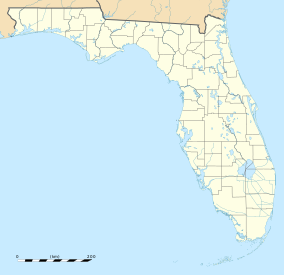This article needs additional citations for verification. (March 2015) |
Long Key State Park is a 965-acre (3.91 km2) Florida State Park located on Long Key, one of the Florida Keys, in Monroe County, Florida, United States. It is at mile marker 67.5 on U.S. 1, 67400 Overseas Highway.
| Long Key State Park | |
|---|---|
IUCN category V (protected landscape/seascape) | |
 | |
| Location | Monroe County, Florida, United States |
| Nearest city | Long Key, Florida |
| Coordinates | 24°49′01″N 80°49′12″W / 24.81694°N 80.82000°W |
| Area | 965 acres (3.91 km2) |
| Governing body | Florida Department of Environmental Protection |
History
editPrehistoric coral reefs grew here over the course of millennia, when the sea level was over 20 feet (6.1 m) deeper. The remnants came to form Long Key, and the rest of the Florida Keys.
The climate and waters provided abundant plant and aquatic life for the Calusa, who settled in the area long before Spanish explorers arrived.
"Cayo Vivora", or Rattlesnake Key, is what the first Spaniards called the island, since to them it resembled a snake with its jaws open.
By the early twentieth century, Long Key became an important depot for the completed Key West Extension of the Florida East Coast Railroad. The railroad's founder, Henry Flagler, also established the Long Key Fishing Camp, a resort that attracted the greatest saltwater fishermen from around the world. But it did not last for long, when in 1935, the Labor Day hurricane devastated the Club, the railroad, and much of the Keys.
The land that came to comprise the park was acquired between 1961 and 1973, with the official opening in 1969.
Biology
editThe plant life at Long Key originated in the Caribbean. Trees include mangrove, West Indian mahogany (Swietenia mahagoni), Jamaica fish poisontree (Piscidia piscipula), poisonwood (Metopium toxiferum), gumbo-limbo (Bursera simaruba) and oysterwood (Gymnanthes lucida).
The shallow waters are a haven for saltwater fish and other marine life. Numerous wading birds can be seen, especially during the winter.
Gallery
edit-
Sunset from the campground.
-
Reddish egret with a great egret looking on.
Recreational activities
editActivities include swimming, snorkeling, kayaking, picnicking, hiking, and birding as well as full facility camping. Amenities include two nature trails (The Golden Orb Trail, and Layton Trail), picnic areas, restrooms, and 60 full-facility campsites.
References
edit- Molloy, Jonny "The Best in Tent Camping Florida". p. 153.
External links
edit- Long Key State Park at Florida State Parks
- Long Key State Park at State Parks
- Long Key State Park at Absolutely Florida

